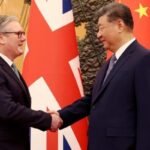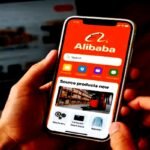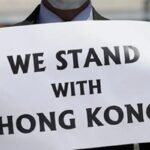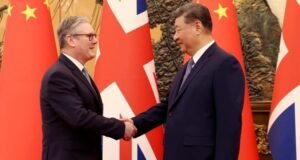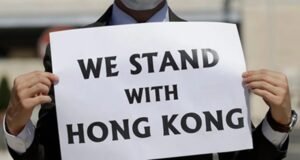
“No matter how well-intentioned an initiative is, it is never appropriate for members of Congress not elected by DC residents to legislate on local DC matters, particularly quintessentially local ones like street names,” says Washington DC’s nonvoting delegate to Congress, Eleanor Holmes Norton (AFP, April 2, 2025).
Then let’s do the inappropriate thing, Nonvoting Delegate Norton.
Over the years, so much federal legislation has involved funding, mandates, or prohibitions related to “local matters,” even “quintessentially local matters”—including the naming of local bridges, local streets, and local airports—that it is perverse for Nonvoting Delegate Norton to draw a line over the Jimmy Lai Way. Does she oppose all federal intervention in state and local matters without exception?
Jimmy Lai Way
“A bill introduced in the House of Representatives would erect the street sign ‘Jimmy Lai Way’ on a stretch alongside the Hong Kong Economic and Trade Office in Washington’s bustling Dupont Circle area,” according to Agence France-Presse.
“While Congress has less jurisdiction outside of Washington, the bill would also direct the US Postal Service to deliver mail to Hong Kong’s offices in New York and San Francisco if they are addressed to ‘1 Jimmy Lai Way’ in either city.”
The street name would be a permanent reminder of the achievements and fate of imprisoned entrepreneur Jimmy Lai, who recently concluded his testimony in a months-long show trial.
Representative Chris Smith, co-chair of the Congressional-Executive Commission on China, says the point of renaming the street is “to remind every [Hong Kong Economic and Trade Office] employee of their part in dismantling the freedoms that once made Hong Kong the most vibrant and prosperous city in Asia.”
If the street is renamed, the trade office employees may not be seeing the new street sign for very long. A bill that passed the House by an overwhelming majority, 413 to 3, in the last session, would have required the HKETO offices in Washington DC, New York, and San Francisco to shut down if it were clear, as it is, that they are not operating with a “high degree of autonomy” from the People’s Republic of China. So far, though, it doesn’t seem that the bill has been reintroduced in the current session.
A dark future
Lai’s fate has not yet been announced. But the Chinese Communist Party will likely keep him in prison for the rest of his life for having fought for Hong Kong freedom and democracy as the publisher of the now-defunct Hong Kong newspaper Apple Daily.
Lai supported the mass demonstrations against the CCP that filled the streets of Hong Kong in 2019. In 2020, with the help of the pandemic protocols, the Party acted to end Hong Kong’s political independence and ability to resist the mainland government by imposing a repressive National Security Law on the city.
Also see:
Acton Institute: Video: “The Hong Konger: Jimmy Lai’s Extraordinary Struggle for Freedom”
